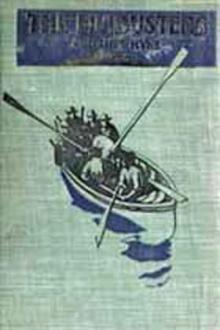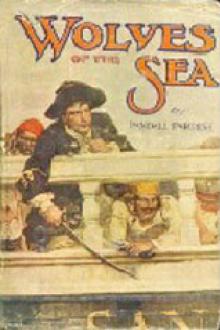Genre Fairy Tale. Page - 8

grandsons had made friends, although both the boys' fathers knew, and approved of it, although for somewhat different reasons.
"The Whitefoot boy," Mr. Davenant had said to his wife, "is, I fancy from what I have seen of him, of a different type to his father and grandfather. I met him the other day when I was out, and he spoke as naturally and outspokenly as Walter himself. He seems to have got rid of the Puritanical twang altogether. At any rate, he will do Walter no harm; and, indeed, I should say that there was a solid good sense about him, which will do Master Walter, who is somewhat disposed to be a madcap, much good. Anyhow, he is a better companion for the boy than the lads down in the village; and there is no saying, wife, how matters may go in this unhappy country. It may be that we may come to our own again. It may be that we may lose what is left to us. Anyhow, it can do no harm to Walter that he should have, as a friend, one in the opposite camp."
Somewhat similar was the talk betwe

!
Nevertheless, no one ever questioned the wealth of the Crudens, least of all did the Crudens themselves, who took it as much for granted as the atmosphere they breathed in.
On the day on which our story opens Mr Cruden had driven down into the City on business. No one knew exactly what the business was, for he kept such matters to himself. It was an ordinary expedition, which consisted usually of half a dozen calls on half a dozen stockbrokers or secretaries of companies, with perhaps an occasional visit to the family lawyer or the family bank.
To-day, however, it had consisted of but one visit, and that was to the bank. And it was whilst returning thence that Mr Cruden was suddenly seized with the stroke which ended in his death. Had immediate assistance been at hand the calamity might have been averted, but neither the coachman nor footman was aware of what had happened till the carriage was some distance on its homeward journey, and a passer-by caught sight of the senseless figure wi

is Photo-Telephone." With that a person talking could not only see the features of the person with whom he was conversing, but, by means of a selenium plate and a sort of camera, a permanent picture could be taken of the person at either end of the wire.
By means of this invention Tom had been able to make a picture that had saved a fortune. But Tom did not stop there. With him to invent was as natural and necessary as breathing. He simply could not stop it. And so we find him now about to show to his chum, Ned Newton, his latest patent, an aerial warship, which, however, was not the success Tom had hoped for.
But just at present other matters than the warship were in Tom's mind. The red shed was on fire.
That mere statement might not mean anything special to the ordinary person, but to Tom, his father, and those who knew about his shops, it meant much.
"The red shed!" Tom cried. "We mustn't let that get the best of us! Everybody at work! Father, not you, though. You mustn't excite

ere at present living.
Besides carrying out the wishes of his patroness, Ben intended to try his hand at mining, and had employed the interval of three weeks since he discovered Mr. Dewey in working the latter's claim, with the success already referred to.
The time when the two friends are introduced to the reader is at the close of the day, when, fatigued by their work on the claim, they are glad to rest and chat. Mr. Bradley has a pipe in his mouth, and evidently takes considerable comfort in his evening smoke.
"I wish I had a pipe for you, Ben," he said. "You don't know how it rests me to smoke."
"I'll take your word for it, Jake," returned Ben, smiling.
"Won't you take a whiff? You don't know how soothin' it is."
"I don't need to be soothed, Jake. I'm glad you enjoy it, but I don't envy you a particle."
"Well, p'r'aps you're right, Ben. Our old doctor used to say smokin' wasn't good for boys, but I've smoked more or less since I was twelve years old."

I
A SCHEME OF REVOLUTION
FLUELLEN always breakfasted off cigarettes in bed, but when we others had finished our meal next morning he joined us in Briggs' room at the Metropole, and listened to the final discussion. He did not talk, but sat in a cane rocker, with a hundred box of cigarettes at his elbow, lighting each new one on the glowing stump of the last, and consuming exactly fifteen to the hour. But then his moustache was rather long, and he did not smoke the ends down very close. He was a big-boned, dark-faced fellow, with a great pucker of wrinkles, which perched between his eyebrows, and which only lifted when the risks of the expedition were touched upon. You could not say that he showed enthusiasm even then; he still looked ineffably bored and weary; but a glint lighted up in his black eyes (when in our talk at the table the chance of violent action was spread out before him) which hinted at a magazine of brazen recklessness stored up somewhere within his listless body, which would bl

assassination plot, and were as vehement of their denunciations of its authors as were the Whigs, remained staunch in their fidelity to "the king over the water," maintaining stoutly that his majesty knew nothing whatever of this foul plot, and that his cause was in no way affected by the misconduct of a few men, who happened to be among its adherents.
At Lynnwood things went on as usual. Charlie continued his studies, in a somewhat desultory way, having but small affection for books; kept up his fencing lesson diligently and learned to dance; quarrelled occasionally with his cousin Alured, spent a good deal of his time on horseback, and rode over, not unfrequently, to Rockley, choosing, as far as possible, the days and hours when he knew that Alured and his father were likely to be away. He went over partly for his own pleasure, but more in compliance with his father's wishes.
"My cousin seldom comes over, herself," the latter said. "I know, right well, that it is from no slackness of her own,

on. Theshuffling of feet, the rattling of chains, the harsh voices of theguard, made it impossible to distinguish any words passing between thetwo. I could only watch them, quickly assured that I had likewiseattracted the girl's attention, and that her gaze occasionally soughtmine. Then the guards came to me, and, with my limbs freed of fetters,I was passed down the steep ladder into the semi-darkness betweendecks, where we were to be confined. The haunting memory of her faceaccompanied me below, already so clearly defined as to beunforgettable.
It proved a dismal, crowded hole in which we were quartered like somany cattle, it being merely a small space forward, hastily boxed offby rough lumber, the sides and ends built up into tiers of bunks, theonly ventilation and light furnished by the open hatch above. Theplace was clean enough, being newly fitted for the purpose, but wastotally devoid of furnishings, the only concession to comfort visiblewas a handful of fresh straw in each bunk. The m

ave spoilt his physiognomy for life; and, depend upon it, as long as life lasts, he will neither forget nor forgive that. I shall also come in for a share of his spite, and it behoves both of us to beware of him."
"But what can he do to us?"
"Caballero, that question shows you have not been very long in this country, and are yet ignorant of its customs. In Mexico we have some callings not congenial to your people. Know that stilettoes can here be purchased cheaply, with the arms of assassins to use them. Do you understand me?"
"I do. But how do you counsel me to act?"
"As I intend acting myself--take departure from Chihuahua this very day. Our roads are the same as far as Albuquerque, where you will be out of reach of this little danger. I am returning thither from the city of Mexico, where I've had business with the Government. I have an escort; and if you choose to avail yourself of it you'll be welcome to its protection."
"Colonel Miranda, again I know not how to thank yo

did not stop until she stood by her side, and looked up in her face with her blue eyes and the two melted stars in them.
"Why, what have you been doing with your eyes, child?" asked the old lady.
"Crying," answered the princess.
"Why, child?"
"Because I couldn't find my way down again."
"But you could find your way up."
"Not at first--not for a long time."
"But your face is streaked like the back of a zebra. Hadn't you a handkerchief to wipe your eyes with?"
"No."
"Then why didn't you come to me to wipe them for you?"
"Please I didn't know you were here. I will next time."
"There's a good child!" said the old lady.
Then she stopped her wheel, and rose, and, going out of the room, returned with a little silver basin and a soft white towel, with which she washed and wiped the bright little face. And the princess thought her hands were so smooth and nice!
When she carried away the basin and towel, the little princess wond

as soon as he was turned safelyupside down, Bill and Sam ran straight at the puddin'-thieves andcommenced sparring up at them with the greatest activity.
"Put 'em up, ye puddin'-snatchers," shouted Bill. "Don't keep ussparrin' up here all day. Come out an' take your gruel whileyou've got the chance."
The Possum wished to turn the matter off by saying, "I see theprice of eggs has gone up again," but Bill gave him a punch on thesnout that bent it like a carrot, and Sam caught the Wombat such aflip with his flapper that he gave in at once.
"I shan't be able to fight any more this afternoon," said theWombat, "as I've got sore feet." The Possum said hurriedly, "Weshall be late for that appointment," and they took their grindstoneand off they went.
But when they were a safe distance away the Possum sang out:"You'll repent this conduct. You'll repent bending a man's snoutso that he can hardly see over it, let alone breathe through itwith comfort," and the Wombat added, "For shame, flapp